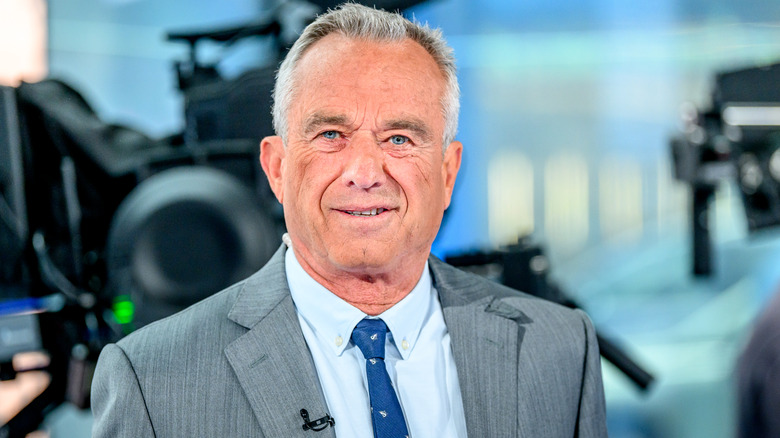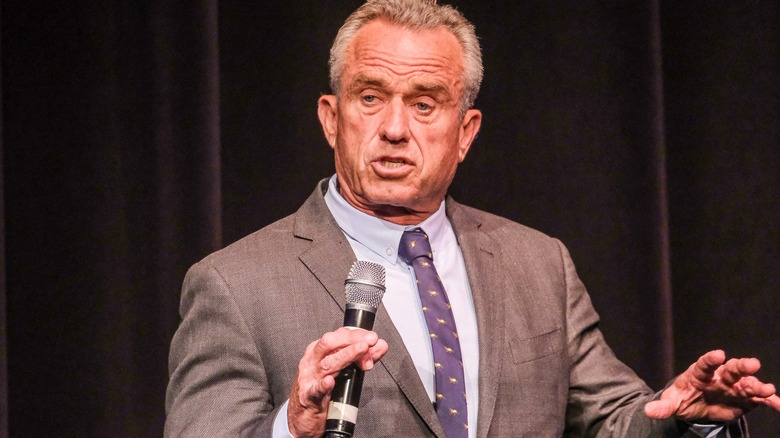RFK Jr.'s Wild Claim About What Really Caused His Health Issues
Robert F. Kennedy Jr., the nephew of the late Former President John F. Kennedy, made a shocking claim about his health problems. RFK Jr., who will turn 71 in January 2025, ran as an independent candidate in the 2024 presidential election, making him more visible than ever before. And Robert already hails from The Kennedy Family, one of the most prolific former first families in American history. Amid the extra spotlight, the controversial politician, whose independent status and lack of familial support made his run for president look more like a wish than an achievable goal, the startling source of some of his past health issues, such as cognitive impairment, surfaced.
According to The New York Times, who cited RFK Jr.'s 2012 deposition, he once revealed that, after experiencing memory fogginess, he went to get checked out a for a brain tumor, a diagnosis that medical professionals almost handed down. However, the dark mass found on Robert's brain was caused by a different medical issue. According to the politician, the mass likely "was caused by a worm that got into my brain and ate a portion of it and then died." RFK Jr., who also admitted to having dealt with mercury poisoning, further elaborated, "I have cognitive problems, clearly." He also added, "I have short-term memory loss, and I have longer-term memory loss that affects me."
RFK Jr. confirmed that he'd recovered from his cognitive impairment
In response to growing concern about Robert F. Kennedy Jr.'s physical fitness, he assured the voting public that his cognitive issues are in the past. "Questioning Mr. Kennedy's health is a hilarious suggestion, given his competition," a May 2024 statement from his campaign contended, seemingly shading rivals Joe Biden and Donald Trump in the process (via the BBC). "The issue was resolved more than 10 years ago, and he is in robust physical and mental health." As for how Kennedy potentially contracted the parasite? Apparently, the presidential hopeful likely picked it up while visiting either Africa, South America, or Asia. Several scientists have challenged Kennedy's claim that the worm actually ate his brain, though, clarifying that the symptoms associated with brain parasites, known formally as neurocysticercosis, can sometimes be mistaken for mercury poisoning, which often results from a fish-dense diet.
If the controversial politician really did have a worm in his brain, it was probably caused by eating pork. "Pigs get infected with a tapeworm," Shira Shafir, an epidemiologist and an associate adjunct professor at the University of California, Los Angeles, confirmed to Scientific American. "When it is in the pig, it penetrates the intestinal wall and goes to the musculature [...] So humans, if they consume uncooked or undercooked infected pork, can get infected with the intestinal form of the tapeworm." When humans aren't practicing proper hygiene, they can easily ingest the eggs through fecal matter, which may eventually end up in the brain.
Robert F. Kennedy also suffers from a neurological disorder
Years before Robert F. Kennedy Jr.'s alleged brain worm became a topic of debate, he opened up about another neurological issue that he'd encountered. Kennedy, for years, has spoken with a strained voice, which much of the public first learned about during a 2008 appearance on "Larry King Live." At the time, Kennedy's voice sounded thin, shaky, and fatigued. He's since disclosed that he lives with a vocal disorder called spasmodic dysphonia, which ABC News described as an "involuntary muscle condition [...] that only affects the voice box." The politician, who'd actually been living with the condition for a while, subsequently confirmed that his vocal issues started in his 40s.
During an interview with the Los Angeles Times, Kennedy confessed that he doesn't enjoy the sound of his voice. "I feel sorry for the people who have to listen to me," the presidential hopeful quipped. "My voice doesn't really get tired. It just sounds terrible. But the injury is neurological, so actually the more I use the voice the stronger it tends to get." Unfortunately, Kennedy, who's thankfully doing much better now thanks to an experimental surgery, also divulged that there was a time when he temporarily lost his voice altogether. "I think my voice was getting worse and worse," he said, adding, "When I opened my mouth, I would have no idea what would come out, if anything."



